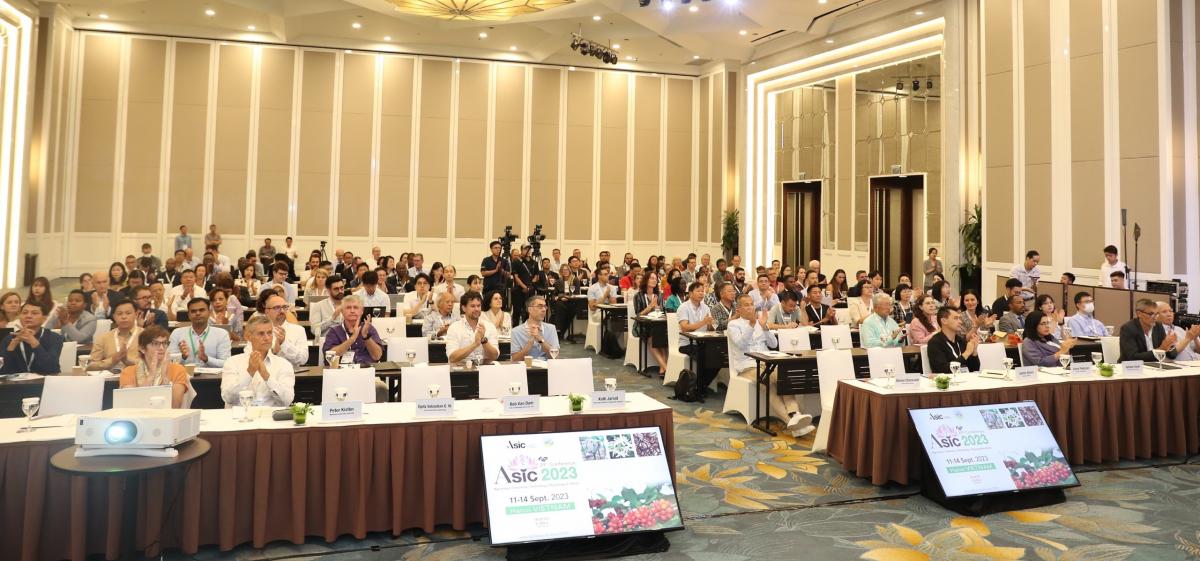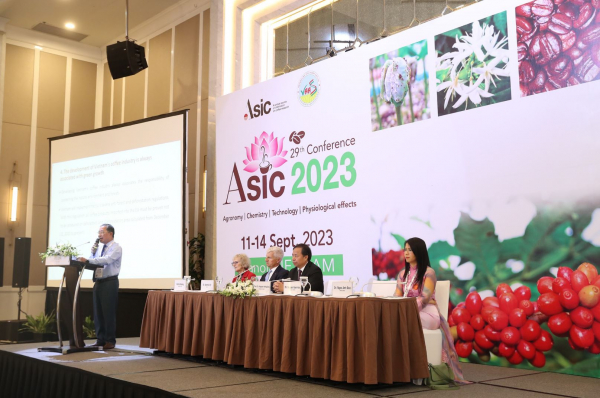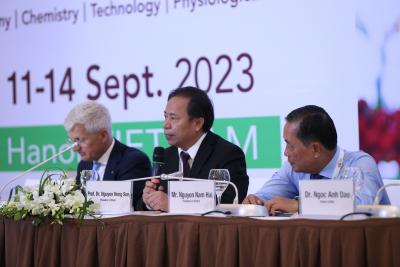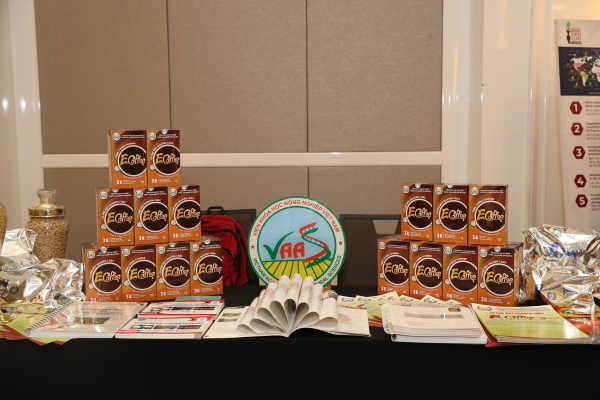- Home
- Worldwide
- Our regional offices
- Continental Southeast Asia
- News : Continental Southeast Asia
- The 29th ASIC Conference on Coffee Science in Hanoi, Vietnam
Beans, Brews, and Breakthroughs at the Association for Science and Information on Coffee (ASIC) 2023 Conference

The ASIC 2023 conference is organised from September 11th to 14th, at the Melia Hotel, Hanoi. Attendees were greeted by an opening session in the morning. © Cirad
Coffee, the world's most universally beloved beverage, has quite a story to tell - one that unfolds biennially at the Association for Science and Information on Coffee (ASIC) Conference. Since its inception in 1966, by Ernesto Illy (Iillycaffè) René Coste (French coffee and cocoa institute, now CIRAD), ASIC has been a driving force in coffee research. Their mission is clear and ambitious: providing a leading platform dedicated to improving coffee quality and spearheading industry-wide expansion. ASIC international scientific conferences in coffee-producing and consuming countries are a crucible where coffee science, technology, and innovation unite through interdisciplinary discussions. Over the course of nearly six decades, the conference has gained international recognition as a nexus for coffee science advancement.
This year, from September 11th to September 14th, ASIC continues its journey through coffee history with a four-day conference at Meliá Hotel, Hanoi, Vietnam. The ASIC 2023 conference is being organised in partnership with the French Agricultural Research Centre for International Development (CIRAD) and sponsored by Illycaffè, the Institute for Scientific Information on Coffee (ISIC), Detech Coffee, Nespresso, Lavazza Group, and Nestlé. As the second-largest coffee producer and the largest producer of Robusta coffee globally, Vietnam offers a unique opportunity for ASIC attendees worldwide to explore the heart of farm-to-cup coffee production.
The conference welcomed its attendees with an opening session led by co-chairs Dr. Astrid Nehlig, President of ASIC, and Dr. Benoît Bertrand, Scientific secretary (Research Director of CIRAD). The panel of experts was composed of Mr. Andrea Illy, Chairman of illycaffè and ASIC's Honorary President, Dr. Nguyen Hong Son, president of the Vietnam Academy of Agricultural Sciences (VAAS), Mr. Nguyen Nam Hai, president of the Vietnam Coffee Cocoa Association (VICOFA), Dr. Bui Quang Dang, VAAS Director of science and international cooperation department, and Dr. Dao Ngoc Anh, Chairwoman of De-Tech. It is important to highlight the presence at this conference of Dr. André Charrier, Deputy Scientific Secretary and member of the ASIC Board of Directors. Dr Charrier is leaving his role this year after working at ASIC for several decades.
"This conference enables countries worldwide to focus on many angles, from scientific and technological advances in breeding, farming, harvesting, preservation, and processing to building value chains and connecting world markets to Vietnam's unique coffee industry." Dr. Nguyen Hong Son shares during his televised speech with VTC 16's reporter.
"Our message to the world is that coffee is Vietnam's strength. We have observed outstanding achievements in breeding, applying farming techniques, and creating high-quality coffee products.
However, we still face many challenges in deep processing, developing value chains, and accessing world markets. Therefore, we need cooperation and sharing in science and technology among international and Vietnamese businesses to help Vietnamese coffee take off in the world market and assist the sustainable development of our industry."
New strains for future gains: The Vietnamese coffee outlook
"Vietnam's coffee industry is going through many ups and downs," Dr. Nguyen Hong Son shares in his opening speech, "There are times when we peak in productivity, quality, and economic efficiency. But, with impacts from the global market, coffee's economic efficiency is lower than that of some other crops. Therefore, coffee-producing regions face many challenges. As for quality management and standardisation, this is a shared difficulty affecting not just coffee but also all other manufacturing industries. One of the most significant obstacles is still long-term maintenance. We are developing on a small, individual, and fragmented production base, so we may need help initially in following international requirements, especially in production sustainability and environmental protection."
This sentiment is echoed in Dr. Bui Quang Dang's opening presentation. While Vietnam's coffee productivity is 1.4 times higher than Brazil's, maintaining its position as the world leader in yield, the country faces many challenges due to its production structure. According to VAAS's presented findings, forty percent of coffee farms are under one hectare in size, fifty-three percent from one to three hectares, and only six percent are above three hectares. Furthermore, seventy-four percent of production operations are household-run as opposed to company/state-farms. These numbers paint a clear picture of Vietnam's challenge in managing and ensuring standardisation of farming practices and quality control.
A Decade of Innovation: Rejuvenating Vietnam's Aging Coffee Farms
“One of the most basic solutions is to help farmers improve their farming practices and production efficiency in the areas we already have.” Dr. Nguyen Hong Son states, “And we found ways to reduce production costs for coffee. Therefore, the farmers can maintain their current cultivable area while increasing production and economic efficiency and avoiding illegal expansion."
Vietnam's coffee productivity soared by an impressive 1.8 times between 2010 and 2020, reflecting a robust agricultural strategy grounded in innovation. Dr. Bui Quang Dang attributes this remarkable uptick to advances in genetics and farming methods. Alarmingly, over a third of the nation's coffee strains are over two decades old, with diminishing yields. In response, from 2016 to 2020, Vietnam rolled out an ambitious initiative, rejuvenating 120,000 hectares of aging farms with hardier, modern varieties. So far, more than 150,000 hectares have benefited from this program. Instead of the traditional seeding, farmers are now employing grafting techniques backed by meticulous irrigation and precise fertiliser management, underscoring the pivotal role science plays in bolstering the country's coffee sector.
"We know that the most crucial advantage of coffee compared to other industries is that this is a tangible commodity production industry, with over eighty-five percent export.” Dr. Nguyen Hong Son explains, “Sustainable development associated with environmental protection is one of Vietnam's top agricultural production goals. Therefore, government management agencies will closely coordinate with businesses and farmers to develop a production system with quality certification that meets international standards.”
The challenges of sustaining top-tier production for an increasingly selective palate highlight Vietnam's pressing need for restructuring. Over the years, Vietnam has made impressive strides, reflecting the nation's ambition to lead and not just follow in the global coffee arena. The ASIC 2023 conference, set against the backdrop of Hanoi, showcases science and technology's pivotal role in the worldwide coffee dialogue. With the industry at the crossroads of sustainability and innovation, the conference's outcomes chart the path forward for coffee stakeholders worldwide.



























